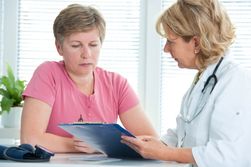5 Menopause-Related Changes You Can Expect

The female body experiences menopause when the ovaries stop producing eggs, thus halting monthly menstruation. The ovaries are responsible for estrogen and progesterone creation and distribution, the hormones that govern menstruation and ovulation. Therefore, when they’re altered, you’ll notice the effects. Most women reach menopause between the ages of 45 and 55. If you’re entering this life stage or will soon, learn what changes you can expect as part of your continuing women’s health care education.
How Does Menopause Affect the Female Body?
1. Hot Flashes
The most common menopause symptom, hot flashes come on suddenly, dramatically increasing body temperature. They can make you perspire, develop a temporarily red face, and increase your heart rate. Hot flashes are believed to stem from circulatory changes, and often occur at night. Triggers include alcohol, caffeine, and spicy foods, as well as hot weather, stress, and binding clothes.
2. Mood Swings
Hormonal fluctuations and changes may cause mood swings, including increased irritability and sensitivity. Some women also feel depressed. Similar to premenstrual symptoms, these often short-lived behavioral changes can be alleviated with healthy activities, such as low-impact exercise, that flood the brain with feel-good chemicals.
3. Urinary Tract Infections
 Changes to the urinary tract combined with lowered estrogen can increase your susceptibility to infection. Urinary tract infections (UTIs) also become more common during menopause because of a thinning urethra that allows more bacteria to enter the bladder. Drink eight to 12 glasses of water per day to flush the bacteria from your body and prevent UTIs. If you have symptoms that don’t clear up, visit Women’s Clinic of Lincoln to inquire about antibiotics.
Changes to the urinary tract combined with lowered estrogen can increase your susceptibility to infection. Urinary tract infections (UTIs) also become more common during menopause because of a thinning urethra that allows more bacteria to enter the bladder. Drink eight to 12 glasses of water per day to flush the bacteria from your body and prevent UTIs. If you have symptoms that don’t clear up, visit Women’s Clinic of Lincoln to inquire about antibiotics.
4. Vaginal Dryness
Moisture coating the vaginal walls decreases due to lowered estrogen and progesterone levels, resulting in vaginal dryness that can cause burning and stinging sensations or painful intercourse. Vaginal lubricants help make sex enjoyable again. If you’re still experiencing problems, talk to visit Women’s Clinic of Lincoln about alternative methods.
5. Fatigue
Hormonal imbalances from menopause can make you feel excessively tired. Known as crashing fatigue, symptoms include sudden weakness, drowsiness, and decreased attention. Lifestyle changes that keep your energy up, such as getting enough sleep and consuming energizing foods, can combat this symptom. If your fatigue gets severe, you may need hormonal therapy.
Discuss these and other menopause-related changes with the gynecologists and nurse practitioners at Women’s Clinic of Lincoln, P.C. Based in Lancaster County, NE, this women’s health care center helps patients of every age take charge of their reproductive health. Call (402) 434-3370 today to make an appointment or learn more about their menopause services online. For the latest tips and news, like them on Facebook.
About the Business
Have a question? Ask the experts!
Send your question

